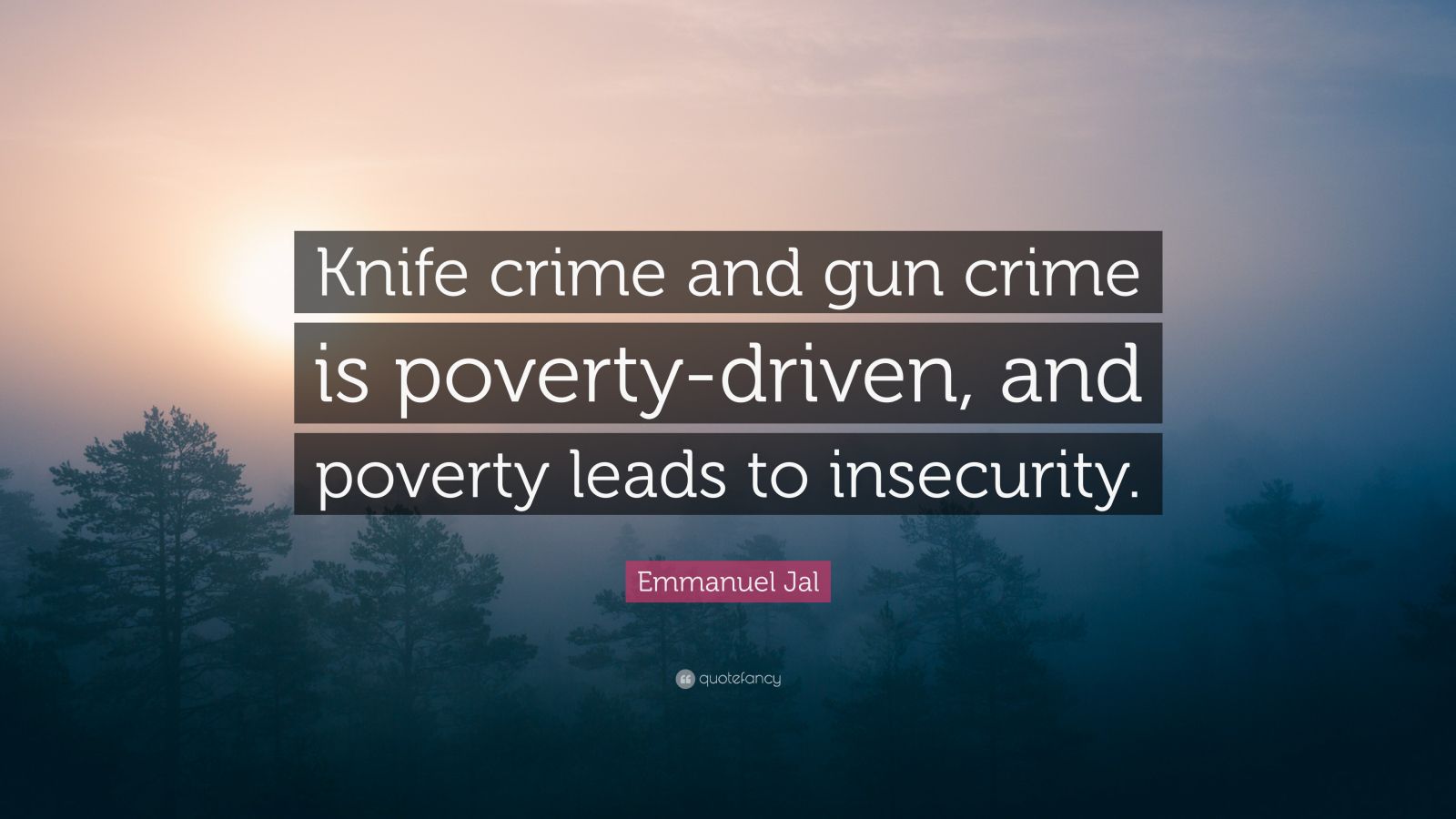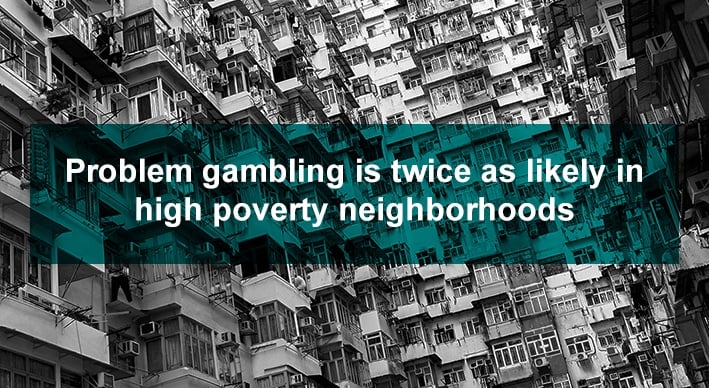Gambling Leads To Poverty
- Gambling Leads To Poverty Impact
- Gambling Due To Poverty
- Gambling Leads To Poverty Increase
- Does Gambling Lead To Poverty
- Gambling Leads To Poverty Affects
Secondary poverty is a description of poverty referring to those living below the poverty line whose income was sufficient for them to live above the line, but was spent on things other than the necessities of life.[1]
However, causality between financial losses and gambling is not always simple. Factors like ill-health may effect both gambling and poverty, and poverty may lead to problematic gambling and vice versa. However, it is clear, that gambling can intensify poverty. Gambling-related debt develops when borrowed money is spent on gambling. It appears there is a direct correlation between the prevalence of problem gambling and the socio-economic level of neighborhoods, with gambling problems increasing as the level of poverty of the neighborhood increases. The introduction of gambling usually does not impact personal income except in the situation where gambling brings in new revenue from outside the community and there is a significant degree of impoverishment prior to gambling introduction. This effect is most evident with the. Gambling can cause homelessness in many different ways just as other addictions can. Gambling can cause a person to get evicted by making him unable to pay bills, by causing divorce, by causing a breakdown of the family support structure, or even due to injuries caused by dealing with criminals involved in gambling.

Gambling Leads To Poverty Impact
In 18th and 19th century Great Britain, the practice of temperance among Methodists, as well as their rejection of gambling, allowed them to eliminate secondary poverty and accumulate capital.[2]
The term was coined by Seebohm Rowntree after his investigations into poverty in York.
Gambling Due To Poverty
Factors contributing to secondary poverty[edit]
Alcohol use[edit]
The Bureau of Labor Statistics found that 'the average American consumer dedicates 1 percent of all their spending to alcohol'.[3]
In Scotland, households spent an average of £8.90 a week on alcohol.[4]
Gambling[edit]
In the United States, the average individual loses $400.00 USD to gambling each year.[3]
The National Anti-Gambling League, which was founded in 1890, condemned the lottery as a cause of secondary poverty.[5] More recently, sociologist Gerda Reith stated that the lottery exploited working classes who see it as one of the sole avenues for liberation from oppression.[5] Reith has stated that governments use the lottery as a means to increase their revenue, calling it an 'extra form of taxation'.[5]
Indeed, people in the low-income brackets (2.8%) spend a higher percentage of their household income on games of chance than people in higher income brackets (0.5%). This is important given that the risk of gambling related harm increases significantly when more than 1% of gross family income is spent on gambling activities. The additional risk of gambling for those in a lower income bracket warrants further attention with the expansion of government-operated gambling throughout Canada, especially since increased rates of problem gambling prevalence are linked to enhanced accessibility and availability[6]. Problem gambling can be defined as difficulties in limiting money and/or time spent on the activity, which leads to problems for the gambler and others[6]. According to Hahmann and Matheson (n.d.), there are two life events that can lead to homelessness; significant job loss and problem gambling.
Tobacco[edit]
In the United States, '14 percent of Americans' incomes are spent on cigarettes, rounding out to roughly one-seventh of their total income.'[3]
In India, smokers spend ₹36,000 annually on smoking cigarettes.[7]
Drugs
'Data from 2003 estimates 26% of the homeless population were drug abusers.'
'A survey from 2007 notes that 23% of unemployed persons had used cocaine at least once.'[8]
See also[edit]
References[edit]
- ^Freeman, Mark (2011). 'Seebohm Rowntree and secondary poverty, 1899-19541'. The Economic History Review. 64 (4): 1175–1194. doi:10.1111/j.1468-0289.2010.00570.x.
- ^Swatos, William H. (1998). Encyclopedia of Religion and Society. Rowman Altamira. p. 385. ISBN9780761989561.
- ^ abcMuniz, Katherine (24 March 2014). '20 ways Americans are blowing their money'. USA Today. Retrieved 16 October 2018.
- ^Milligan, Brian (16 February 2017). 'ONS figures show UK spending less on alcohol and tobacco'. BBC. Retrieved 16 October 2018.
- ^ abcCasey, Emma (2016). Women, Pleasure and the Gambling Experience. Routledge. p. 28. ISBN9781134779680.
- ^ abHahmann, T. E., & Matheson, F. L. (n.d.). Problem Gambling and Poverty. Retrieved March 26, 2019, from https://www.greo.ca/Modules/EvidenceCentre/files/Hahmann_and_Matheson_(2017)_Problem_gambling_and_poverty.pdf
- ^Saravanan, P (21 June 2016). 'Cigarettes & smoking: Here's how to save Rs 36,000'. The Financial Express. Retrieved 16 October 2018.
- ^'Economic Status and Abuse'. Dual Diagnosis. Retrieved 2019-03-28.
Further reading[edit]
- Briggs, Asa: 'A Study of the Work of Seebohm Rowntree: 1871-1954', Longmans, 1961
- Rowntree, B S: 'Poverty: A Study in Town Life', page 298. Macmillan and Co., 1901
What is Poverty?
Poverty means lacking of basic needs like clothing, shelter, food, health facilities. Poverty refers to limited resources and low standard of living which cannot fulfill the basic human needs. Currently in India, Pakistan and other countries around the globe, poverty is a major social problem. Poverty can cause and leads the people to corruption, bribe, diseases, lack of education, domestic abuse, parental issues, unemployment, drug abuse etc.
What is Poverty Line?
“It is the minimum level of income required to fulfill the basic needs of human beings”.
Poverty as a Social Problem
Pakistan, Indian and bangladesh are mostly agricultural by traditions and the social life of the people is simple related to their culture and resources. The resources at our disposal and discovered up till now have not been mobilized up to the advance stage. As it found in advanced countries, who utilized the sources of oil and gas and water for the welfare of the human beings.
Gambling Leads To Poverty Increase

The problems with Asian people are that some of the resources, which are very costly have not been discovered from earth. Gold, silver, copper, iron, metals have not been fully discovered and utilized. Gas and oil reserves have not been fully discovered by the experts. There are three sources of man while living as a member of society. Time, money and labor are great sources at our disposal. Time is the time of life and age which is not fully utilized because our culture is not industrial and mostly we are not trained in technology of using resources available. We are getting our young men trained in technical fields and have succeeded to great extent.
Does Gambling Lead To Poverty
Our medical and engineering skills have been saturated in Pakistani and indian society due to lack of economic wealth and they are in search of jobs in foreign countries. This has given an idea ‘that our society is not able to absorb technical skill due to lack of technological resources with us. Our culture is traditional and requires manual labor more than technical labor. Weightlifter, road builders and menders of broken things are the required persons. These all things have led to decide that Pakistani society and the people are poor and are not able to cover their foreign exchange, foreign expenditure and needs of the nation within the country.
The main cause of this social problem is that human resources are mostly with talent without technical training. What we want a mechanic of a tractor, car, bus and the motor cycle. This is the most important requirement of technical work. Because our society needs these services.
The next of the resources is money and wealth this is drawn from the economic resources of land, industry, labor, technical work, business, trade, services and professional works. These all require talent and training in the worker with material equipment in offices and buildings. They are provided with technical skills with the objectives of wealth got from agricultural produce, industrial production, profits and gains from business and trade, work in economic institutions with the expansion of economic productions. The production in economy leads to expansion of wealth and resources.

This production in economy depends upon the third factor as labor. It is the main theme of all activities in life. Man is useless without work. Labor is of three types. Non–skilled labor is that one in which the workers are laborers in the farms, on road, lifters of weight in shopping centers and buildings construction. These are the most cheap servants available easily in Pakistan, India, Bangladesh etc. They are huge in number because they are non – technical members and mostly illiterate. This is the poorest class with least resources with their family.
The skilled are those laborers, who are workers in highly technical and industrial plants. They build buildings of high standards. They are the engineers, medical practitioners, legal advisors, mechanic, judges, police officers, the muftis of Shariat Laws. These are skilled workers of the nation and work in different fields of life, in which the needs of satisfaction for the nationals are fulfilled.
Cause of Poverty
- Lack Education
- High Birth Rate
- Unequal distribution of factors of production
- Traditional Agricultural System
- Corruption in society
- Political and economic Instability
Solutions to Poverty
Gambling Leads To Poverty Affects
- Government must adopted FREE EDUCATION FOR ALL policy
- Control birth rate
- Microfinance schemes should be initiated for starting small business
- Transparency in government spending
- Corruption a root cause should be eradicated
- Bring rich people in tax bracket
- Reforms in Agricultural system